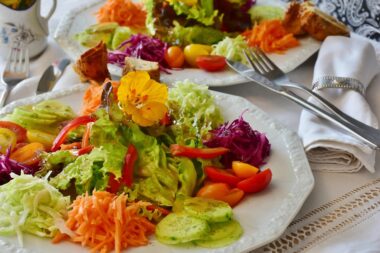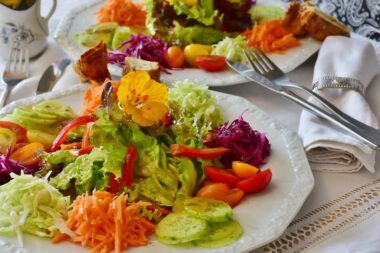How to Create a Weekly Meal Plan for Sustainable Weight Loss
Creating a weekly meal plan is essential for achieving sustainable weight loss. It allows you to organize your meals in advance, ensuring that you have a balanced diet while helping you avoid unhealthy last-minute food choices. Start by identifying your caloric needs based on your weight loss goals. Use online calculators to estimate the right daily intake, and adjust as necessary based on your activity level. Once you know your caloric needs, incorporate a variety of food groups including lean proteins, whole grains, healthy fats, and plenty of fruits and vegetables. Planning your meals ahead of time not only saves you time and stress but also helps you resist the temptation of quick, unhealthy options. When creating your meal list, include recipes that you enjoy and ensure they fit within your dietary preferences. Writing everything down can also keep you accountable, making it less likely that you’ll stray from your plan. Remember, consistency is the key to achieving long-term weight loss success. Start with a simple plan and gradually modify it as you discover what works best for you.
Another important aspect of meal planning is prepping your meals in advance. Meal prep helps to save time during the week and makes it easier for you to stick to your healthy eating habits. Choose a day of the week for meal prepping, such as Sunday. During this time, prepare multiple recipes that you can store in individual portions. Use airtight containers to keep your food fresh throughout the week. Portioning meals in advance can also help manage portion sizes, supporting your weight loss goals. Consider including a mix of snacks in your meal plan, as this can help curb hunger and prevent overeating. For example, set aside healthy snacks like fresh cut vegetables, yogurt, or nuts. Also, be sure to stay hydrated, as water plays a vital role in weight loss. Carry a reusable water bottle with you each day, reminding yourself to drink plenty of fluids. Incorporate herbal teas or flavored water for variety. By planning and preparing your meals and snacks ahead of time, you position yourself for success and create healthy habits that can last a lifetime.
Incorporate Variety and Seasonal Ingredients
To keep your meal plan interesting, incorporate a variety of seasonal ingredients into your recipes. Fresh produce not only tastes better but also is often more nutritious and cost-effective. Visit your local farmer’s market or grocery store and look for fruits and vegetables that are in season. This can help you save money and encourage you to try new foods. Experimenting with different cuisines can also make meal planning more enjoyable. For example, try making dishes inspired by Mediterranean, Asian, or Mexican dishes. Use herbs and spices to enhance flavor without adding extra calories, making your meals both tasty and healthy. Additionally, ensure that your meals contain a balance of macronutrients — carbohydrates, proteins, and fats — for sustained energy levels throughout the day. A well-rounded plate can not only aid your weight loss efforts but will also provide essential nutrients to support overall health. Keep a list of your favorite recipes handy for easy reference each week. This way, your meal planning becomes a creative outlet rather than a chore, motivating you to stick to it consistently.
Don’t forget to involve family members or friends in your meal planning process. It can be an enjoyable activity that encourages accountability and teamwork in your weight loss journey. You can share ideas and recipes, and even try new dishes together. Additionally, this promotes a healthier lifestyle in your household, which can be beneficial for everyone. Discuss what everyone likes or dislikes, and create a joint meal plan that suits all preferences. By being inclusive, you’ll be more likely to prepare meals that everyone enjoys, making it easier to stick with your weight management plan. Make it a point to share meals together; this can foster family bonding and support as you all strive for better health. Engage in fun cooking activities and teach each other how to prepare different dishes. The act of cooking can also serve as relaxation and a means to destress. Most importantly, be flexible with your meal plans. Understand that changes may happen, and that’s alright. By being adaptable, you will be less likely to feel defeated by minor setbacks in your meal planning journey.
Utilize Technology for Meal Planning
In our modern world, technology offers numerous tools to assist with meal planning for sustainable weight loss. Various apps are available that allow you to create shopping lists, find healthy recipes, and track your nutritional intake easily. Consider utilizing these tools to streamline your planning process, allowing you to focus more on cooking and less on logistics. Some apps even allow you to input dietary restrictions or preferences, tailoring recipes to meet your specific needs. By using technology, you can access nutritional information about ingredients, helping you make informed choices. Additionally, you can find communities online for meal planning inspiration, providing support as you navigate your weight loss journey. Engaging with others who share similar goals can create a sense of camaraderie and encouragement. Social media platforms can prove helpful for finding new ideas and recipes that align with your objectives. There are countless blogs and video tutorials dedicated to meal prepping, cooking techniques, and budgeting tips. By leveraging technology, you can make meal planning more efficient, enjoyable, and ultimately successful in achieving your weight loss goals.
With all the planning and preparation, it’s important to maintain a growth mindset throughout your journey. Recognize that changes won’t happen overnight; sustainable weight loss is a gradual process that requires persistence and patience. Be kind to yourself during this journey; it’s normal to encounter obstacles or slip-ups along the way. Instead of getting discouraged, focus on learning from these experiences and adjusting your meal plan accordingly. Consider keeping a journal to track your food intake, feelings, and any challenges you face. This can provide valuable insights into your eating habits and help you identify patterns that may need adjustment. Celebrate your small wins, whether it’s cooking a new recipe or sticking to your plan all week. Positive reinforcement helps maintain motivation, making the journey more enjoyable. Always remind yourself why you embarked on this weight loss journey, and visualize your end goals. By staying focused and committed, while practicing self-compassion, you will discover a healthier lifestyle that enhances both your physical and mental well-being.
Stay Committed to Your Goals
Lastly, to create a lasting meal plan for sustainable weight loss, prioritize consistency and commitment. Make a schedule that you can realistically follow, allowing time for meal planning and preparation each week. When you establish a routine, you’re more likely to hold yourself accountable. Set boundaries around food choices and prioritize your meal plan when out for social events. Carry healthy snacks to avoid the temptation of less favorable options. Stay engaged with any support groups or friends who share your weight loss goals to remain motivated. Sharing your journey with others can make a significant difference in your overall success. Keep revisiting and tweaking your meal plans as your preferences and needs evolve. Remember that flexibility is crucial for long-term adherence to your weight loss plan. There will be occasions where you’ll have to modify your meals or try something new. Embrace these moments as opportunities to learn about your body and food. Ultimately, with commitment and structured meal planning, you’ll pave the way for sustainable weight loss results that truly impact your life.
In conclusion, implementing a structured meal planning regime for sustainable weight loss involves several considerations. Prioritize variety, balance, and preparation while utilizing available tools and resources to support your journey. Make it a fun process by incorporating new ingredients and recipes, and don’t hesitate to involve family and friends for motivation. Embrace technology for effective planning and tracking. Remember to maintain a positive mindset and celebrate your accomplishments as you progress. Weight loss is not just about shedding pounds; it’s about cultivating healthy habits that lead to a better quality of life. Achieving your goals requires diligence and self-love, making meal planning an integral part of your journey. Reflect on your experiences, learn from them, and keep refining your approach. In time, meal planning will become second nature, contributing positively to your lifestyle. As you navigate this journey, practice patience with yourself. Sustainable changes don’t happen overnight, but with each step forward, you’ll get closer to your goal. Stay focused, stay committed, and enjoy the process as you create meals that nourish your body and mind.





